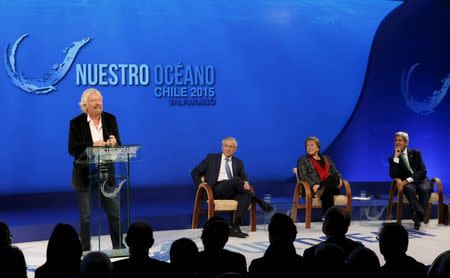Chile, United States create new marine conservation parks
By Lesley Wroughton and Gram Slattery VINA DEL MAR, Chile (Reuters) - Chile on Monday said it would create one of the world's largest marine conservation parks, and Washington announced two new marine sanctuaries and a drive against illegal fishing to help protect the world's oceans. Addressing the second annual 'Our Ocean' international conference in Chile's coastal town of Vina del Mar, President Michelle Bachelet said the protected area would encompass the remote Easter Island, part of Chile's territory some 3,800 km (2,361 miles) west of Santiago in the middle of the Pacific. A separate park will also protect other island chains, including the Juan Fernandez archipelago, which has been a region of contention between commercial and artisanal fishermen. The proposal should help rebuild depleted fisheries, conservationists said. The parks host one of the highest densities of endogenous marine species on the planet. Overall, over 1 million square kilometres (386,100 square miles) of ocean would be protected, Bachelet said. "This is Chile's contribution to the ocean, so that our children and grandchildren may enjoy what we are doing here," Bachelet told attendees to loud applause. In a video address to the conference, Obama said the United States would create marine sanctuaries in Maryland and in an area off Wisconsin's Lake Michigan, and will take new action to combat illegal fishing. The proposed sites - a 14-square-mile (36-square-km) section in the Mallows Bay-Potomac River waters of Maryland, and an 875-square-mile (2,265-square-km) in Lake Michigan, will be the first new national marine sanctuaries declared by the federal government since 2000. Addressing the conference, U.S. Secretary of State John Kerry said the United States was increasing efforts to track illegal fishing. "There is literally too much money chasing too few fish," Kerry said, adding: "We have to make illegal fishing harder to get away with." The White House said the United States would launch a global initiative, called Sea Scout, to help in the fight against growing unregulated fishing. The National Oceanic and Atmospheric Administration will announce steps as well to provide data and technical assistance to target illegal fishing, including a space-based monitoring sensor that will be implemented next year in Indonesia, the Philippines and three other countries. (Reporting by Lesley Wroughton and Gram Slattery, Editing by Rosalba O'Brien and W Simon)





